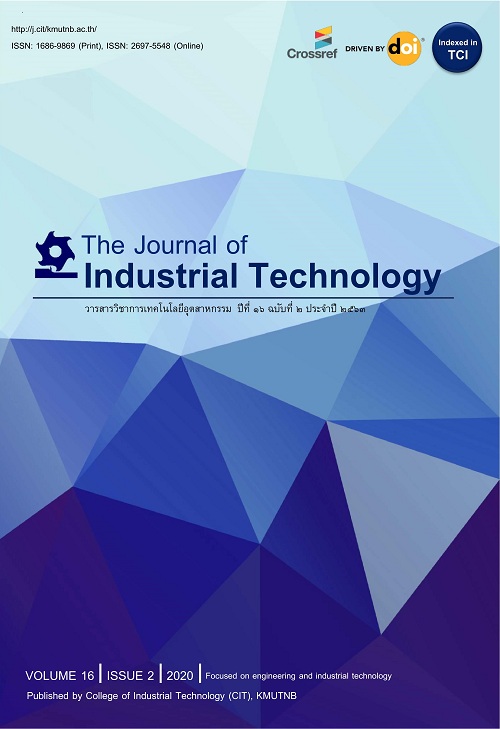Biogas for the use as Fuel in Sour Tamarind Cube Manufacture of OTOP in Duang Thong District, Phetchabun Province
Abstract
The goal of this project is to design and construct a gas purification system and a gas compressing unit for biogas, an eco-friendly fuel used to produce sour tamarind at the OTOP manufacturing facility in Duang Thong District, Phetchabun Province. The first aim is to study and build purifying scrubbing equipment. A scrubbing device is a type of gas purification system used to separate raw biogas and remove pollutants as it exits the digester. Its filter parts are made of carbon dioxide (CO2), water vapour (H2O), and hydrogen sulfide (H2S). The second step is to build and test a machine for compressing pure biogas into a gas tank. This machine includes a compressor and a metering system controlled by an electric device. The last step is to conduct a scrubbing test and an examination of the proper biogas output. The results of the test and analysis found that up to 98.0% of the biogas produced by the scrubber is Methane (CH4) gas. The remaining 2 percent is other impurities or compounds from raw biogas, which could potentially be removed. The average test result of filling the gas tank with the gas each time revealed that it could hold 0.2 kilograms of gas, consumed 0.037 kWh of electricity, took 12 minutes and 23 seconds to fill, and could bake 125 kilograms of tamarinds in 1 hour and 20 minutes. The result of low-cost solar radiation protection drying technology transfer at Duang Thong Community Enterprise Group in Phetchabun Province is based on the demonstration of baking at the enterprise group and the delivery of knowledge about the bakers to 20 group members. All three aspects of the assessment had an average of 4.7 out of 5. which shows satisfaction at the highest level.
Keywords
[1] Department of Alternative Energy Development and Efficiency, Biogas production from ranch waste and industrial plant, Ministry of Energy, Bangkok, Thailand, 2020. (in Thai)
[2] Department of Industrial Works, Operations related to design production quality control and the use of biogas for industrial plants manual, Ministry of Energy, Bangkok, Thailand, 2020. (in Thai)
[3] N.H.S. Ray, M.K. Mohanty and R.C. Mohanty, Biogas compression and storage system for cooking applications in rural households, International Journal of Renewable Energy Research, 2016, 6(2), 32-38.
[4] V.R. Gaikwad and P.K. Katti, Bottled biogas: A future source of renewable energy, Project, Dr. Babasaheb Ambedkar Technological University, Maharashtra, India, 2018, 90-101.
[5] V.R. Gaikwad and P.K. Katti, Design of Biogas Scrubbing, Compression and storage system, IOSR Journal of Electrical and Electronics Engineering, 2014, 1(2), 58-63.
[6] V.K. Vijay, R. Chandra, P.M.V. Subbarao and S.S. Kapdi, Biogas purification and bottling into CNG cylinders: producing bio CNG from biomass for rural automotive applications, The 2nd Joint International Conference on Sustainable Energy and Environment (SEE 2006), Proceeding, 2006, 1-6.
[7] D. Pananont, Acid in the cooling system with filter driers, ASHRAE Journal, 2004-2005, 2005, 11-16. (in Thai)
[8] P. Kanpee, Electric motor control, Book Center Company, Bangkok, Thailand, 1992.
[9] W. Boonton, Cooling, Chulalongkorn University Press, Bangkok, Thailand, 2007.
[10] L. Saiyot and A. Saiyot, Educational Research Techniques, Suriyasan Company, Bangkok, Thailand, 1992.
Refbacks
- There are currently no refbacks.






